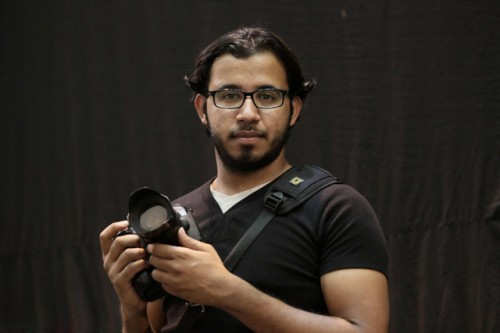On 27 March 2018, a Bahraini appellate court confirmed the 10-year prison sentence and arbitrary denaturalization of photojournalist Sayed Ahmed al-Mousawi. In 2017, Bahrain’s highest court reversed the original ruling, leading to the new appeal. Though al-Mousawi has the opportunity to petition the Court of Cassation again, he remains arbitrarily detained.
Bahraini authorities first arrested al-Mousawi and his brother Sayed Mohammed on 10 February 2014. Al-Mousawi was detained at the Ministry of Interior’s Criminal Investigations Directorate (CID) for six days, where he was hung from the door four times, electrocuted, prohibited for sitting for four days, stripped naked, beaten, and sexually assaulted. He was brought to trial ten months later, on 24 December 2014, where he was charged with forming and participating in a terror cell because he allegedly provided SIM cards to protesters and photographed anti-government demonstrations. Al-Mousawi and other witnesses denied the terror allegations.
Al-Mousawi is an internationally recognized photojournalist, who has won 169 international photography awards, including some while he was in arbitrary detention. The Government of Bahrain has increasingly targeted journalists like al-Mousawi in a wide-ranging crackdown on free press. Bahraini authorities regularly subject journalists to judicial harasssment, including harsh prison sentences on fabricated charges related to their work. Individuals accused of terror crimes under the kingdom’s excessively broad anti-terror legislation commonly face citizenship revocation as well, often rendering them stateless and unable to gain access to government resources. Since 2011, Bahrain has revoked citizenship from over 550 individuals, with more than 150 denaturalized in 2017. According to Lynn Maalouf, the Middle-East Research Director at Amnesty International, “The Bahraini government is using revocation of nationality – rendering many of its citizens stateless in the process – and expulsion, as tools to crush all forms of opposition, dissent and activism.” Bahrain ranks among the worst countries in the world for press freedom. In Reporters sans Frontieres’ 2017 World Press Freedom Index, Bahrain sits at number 164 out of 180 countries – two positions lower than in 2016.
On 4 June 2017, the authorities effectively barred free press by indefinitiely suspending the Bahrain’s only independent newspaper, Al-Wasat. The Ministry of Information Affairs claimed that Al-Wasat was in violation of the law by “spreading what would stir divisions within the community and undermine the Kingdom of Bahrain’s relations with other countries” after it published an opinion article covering the protests in Morocco. Since Al-Wasat’s opening in 2002, the newspaper has been repeatedly shut down by the Bahraini government and its employees have been targeted for reprisal. As a result of the June 2017 indefinite suspension, however, Al-Wasat was forced to layoff its staff and ultimately cease operations. The authorities have continued to target Al-Wasat employees, however, and in October 2017 a court imprisoned Mahmood al-Jazeeri, one of the newspaper’s journalists, in an unfair mass trial. An appeals court upheld the decision earlier in March 2018.
The continued suppression of press freedom in Bahrain is partially driven by the ingrained culture of impunity for crimes against journalists. On 31 March 2012, for example, Ahmed Ismail Hassan, a photojournalist, was shot and killed while covering a protest in response to the Formula One Grand Prix. Hassan was present when security forces and armed men began violently dispersing the protest. He was fatally shot in the upper thigh with live ammunition, which severed a major artery. Though witnesses stated that Hassan was specifically targeted by the security forces because he was holding a video camera, and despite calls for investigation by the United Nations, no one has ever been held accountable for Hassan’s murder. The government has similarly failed to properly address the cases of Karim Fakrahwi, a cofounder of Al-Wasat tortured to death by the National Security Agency in 2011, and Nazeeha Saeed, a journalist for France 24 and Radio Monte Carlo who was tortured and is continuously judicially harassed.
Journalists, photographers, and independent media organizations are prevented from operating freely in Bahrain. The Government of Bahrain must immediately lift its restrictions on free press, including by releasing all imprisoned journalists like Sayed Ahmed al-Mousawi, reopening Al-Wasat, and revoking its abusive anti-terror legislation.





